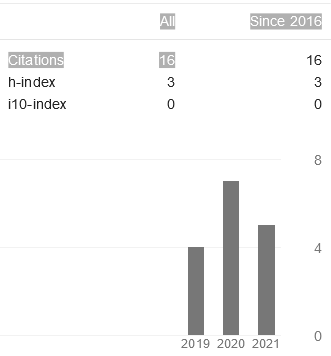Factors Associated with Pulmonary Tuberculosis Patients Who Received Anti-TB Treatment
Abstract
Pulmonary tuberculosis is a chronic infectious disease that was firmly related to the environment and human behavior. To overcome pulmonary tuberculosis, various factors associated with TB who received anti-TB treatment became significant. Therefore, we extended the Riskesdas data analysis To determine the various factors related to Pulmonary TB patients received anti-TB treatment. Subject treated with anti-TB treatment became the dependent variable, while the independent variables consisted of subjects characteristics (age, gender, and education level), socio-economic status and residential classification. Logistic regression was used to identify factors associated with the use of anti-tuberculosis. The result showed that male subjects with age of 35 until 44 years, low education, consider poor in economic and inhabited in an urban area more common in subjects with anti-TB treatment. Thus, characteristics of subjects (age, gender, and education level), socio-economic status and residential classification are the factors of subjects treated with anti-tuberculosis in Indonesia.
Authors who publish with us agree to the following terms:
- Authors retain copyright and grant the publisher right of first publication with the work simultaneously licensed under a Creative Commons Attribution License that allows others to share the work with an acknowledgement of the work's authorship and initial publication in this proceeding.
- Authors are able to enter into separate, additional contractual arrangements for the non-exclusive distribution of the proceeding's published version of the work (e.g., post it to an institutional repository or publish it in a book), with an acknowledgement of its initial publication in this proceeding.
- Authors are permitted and encouraged to post their work online (e.g., in institutional repositories, pre-prints sites or on their website) prior to and during the submission process, as it can lead to productive exchanges, as well as earlier and greater dissemination of published work





_page-00011.jpg)
